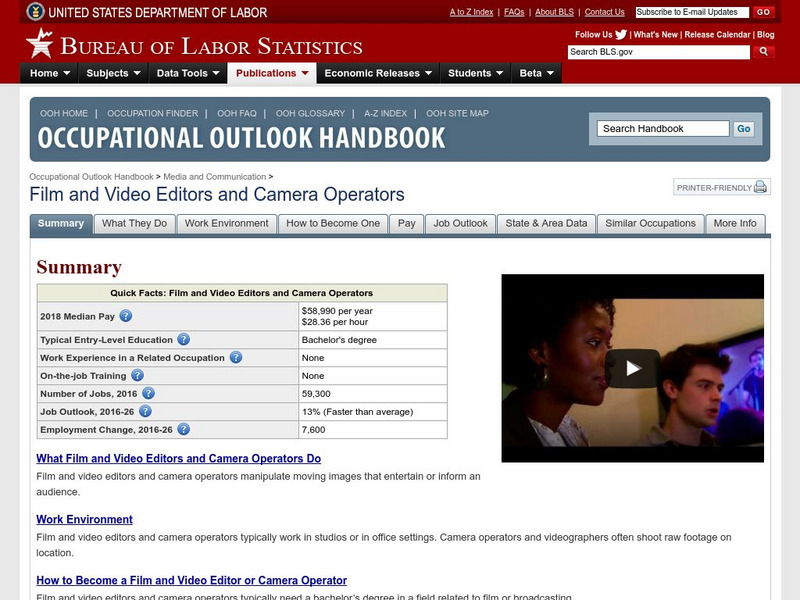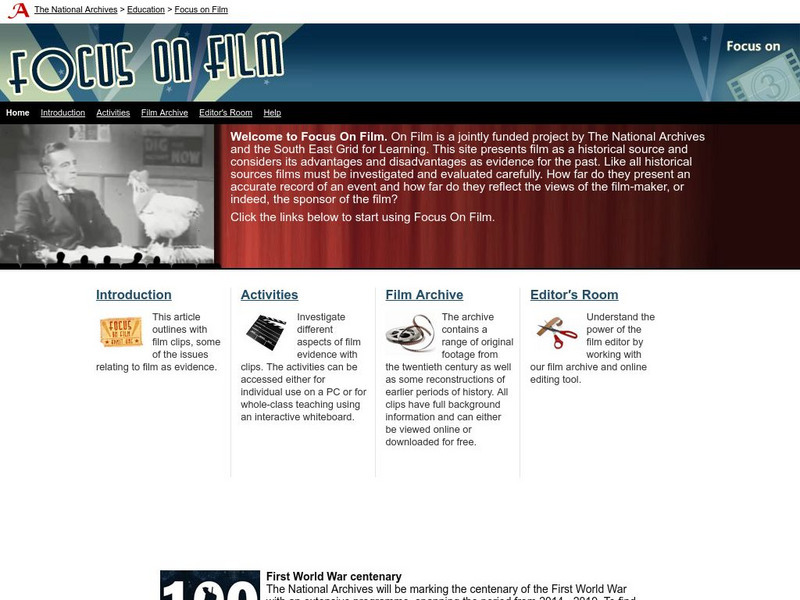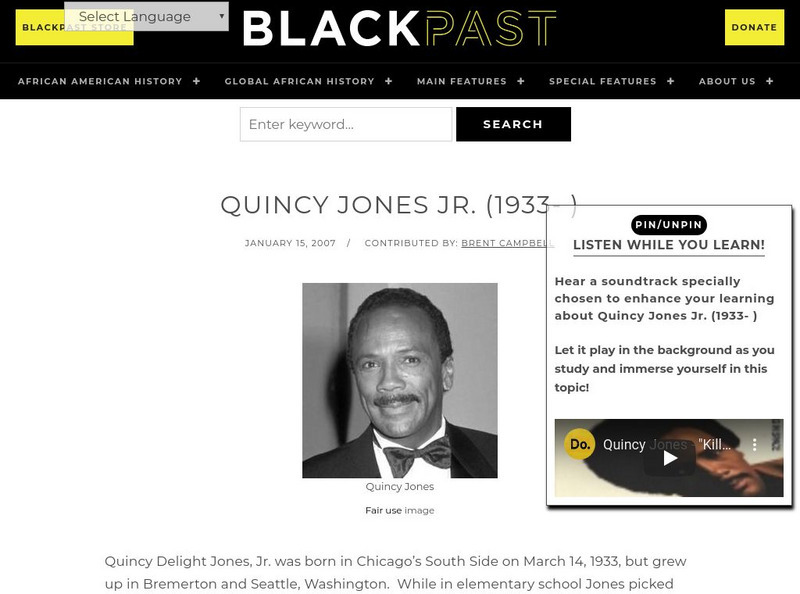Hi, what do you want to do?
US Department of Labor
Bureau of Labor Statistics: Film and Video Editors and Camera Operators
This site by the U.S. Bureau of Labor Statistics provides very useful information on the career of a TV, video, and motion picture camera operator and editor.
PBS
Pbs Teachers: Jason and the Golden Fleece
Explore characterization, plot and setting and compare these elements in mythology and modern works of literature, film and television. Retell myths in modern settings or modern-day stories using a mythological Greek setting. While this...
OpenStax
Open Stax: Prosperity and Cold War Fears 1945 60: Popular Culture and Mass Media
Examines the impact that rock and roll music, movies and the invention of television had on America in the 1950s.
US Department of Labor
Bureau of Labor Statistics: Actors, Producers, and Directors
Along with information about Directors, this site evaluates the Nature of Work, Working Conditions, Employment, Training, Other Qualifications, Job Outlook, Earnings, Related Occupations, and Additional Information for Actors and Producers.
Childnet
Childnet: Online Safety: Music, Film, Tv and the Internet
While the internet plays home to a fantastic range of content, not all of this content is accessed legally. It can be challenging to encourage children and young people to change the source of their content, particularly if they are not...
Other
High Tech Productions: History of Film & Television
High Tech Productions provides a timeline history of television. It starts at the invention of the motion picture camera and goes all the way through television's greatest moments.
National Archives (UK)
The National Archives: Focus on Film
Should students believe everything they see on tv? The National Archives provides this resource for students to examine cinemas as an accurate source of history. Links to archived videos and activities are provided. RI.11-12.7 Eval...
BBC
Bbc Bitesize Revision: Writing a Script for Radio or Tv/film
As part of a revision and writing section of BBC Bitesize, this site goes over several tips involved in writing a a script. The information includes plot, radio script, sound effects, and TV or film script.
National Museum of Science and Industry (UK)
Ingenious: Science and Technology Images
This collection of images from Ingenious combines the collections of several museums - Science Museum, the National Museum of Photography, Film & Television, the National Railway Museum, the Science & Society Picture Library and...
University of Virginia
Virginia Center for Digital History: Television News of the Civil Rights Era
A rich collection of streaming video samples of television news footage from 1950 to 1970, along with an assortment of primary source documents, first-person accounts, a glossary of terms, and essays and analysis for learning about the...
PBS
Wnet: Thirteen: New York: A Documentary Film Online
This is the companion site to the television series on New York that covers "nearly 400 years and 400 square miles" of a "dynamic city that has played an unparalleled role in shaping the nation."
Black Past
Black Past: Jones, Quincy
This encyclopedia entry offers a brief look at Quincy Jones, who began as a jazz trumpet player, but has expanded his career beyond music into film and television. There are links to websites for more information.
Arizona State University
Arts Work: Theater Criticism
A solid approach to the basics of viewing and evaluating a dramatic experience, including theater, film, and television. Covers description, analysis, interpretation, and evaluation in the context of theater.
American Academy of Achievement
Academy of Achievement: Carol Burnett
Biography of Carol Burnett, iconic American comedic actress who appeared in many films and television shows winning critical acclaim. Students can read about Carol Burnett, listen to an interview and view pictures in the photo gallers.
Tom Richey
Slide Share: Television Performance Techniques Module 6
A slideshow based on Herbert Zettl's "Television Production Handbook" that explains techniques that one needs to be aware of when performing in front of a television camera. Discusses questions to ask the director regarding how the...
Careers New Zealand
Careers New Zealand: Director (Film/television/radio/stage)
This site explores what it takes to become a director. Content includes a focus on job requirements, working and employment conditions, a personal profile of a current director, and more.
British Council
British Council: Directory of International Film & Video Festivals
An essential reference tool for finding film, terlevision, and video festivals all over the world. This directory lists details on how to enter these festivals which are searchable by location, title, category, or date.
Careers New Zealand
Careers New Zealand: Film/television Camera Operator
This resource provides information about the career of a camera operator. Information includes typical tasks and duties, personal requirements needed for the job, education requirements, typical working conditions, salary, and future job...
National Endowment for the Humanities
Neh: Edsit Ement: Scripting the Past: Exploring Women's History Through Film
In this lesson plan, young scholars will consider Scripting the Past: Exploring Women's History Through Film. Worksheets and other supporting materials can be found under the Resources tab.
IMDb
Internet Movie Database: Black October (2000) (Tv)
The Internet Movie Database entry for the Canadian documentary film "Black October". Accessible is a movie trailer for the film, a plot summary, and full credits. "Black October" is a film about the 1970 October Crisis.
Other
Lds film.com: Alan and Naomi (1992)
Several reviews of the film "Alan and Naomi," (1992) which was adapted from young author, Myron Levoy's novel by the same name. Reviews come from the Washington Post, Deseret News, TV Guide Online and more.
International Reading Association
Reading Online: Classroom Strategies for Exploring Authenticity in the Media
Four innovative classroom activities that actively engage students in analyzing and criticizing media messages. SL.11-12.2 Eval&Integrate sources
Department of Defense
Do Dea: Art Appreciation: Unit 7: Photography
In this seventh and final unit of a course on Art Appreciation, students learn about photography and significant photographers. This is followed by a discussion of television and film. Students will learn terminology used, technical...



























